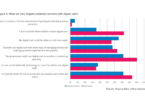Yesterday, the Bank of Korea (BOK) released its 2022 Payment and Settlement Systems Report, which among other things, dives into the current status of work on its central bank digital currency (CBDC), the digital won.
The paper says the central bank has now “massively expanded” the dedicated CBDC staff to meet growing demands for research into system designs and institutional issues. It also reflects on its recent CBDC experiments, which have included work with 14 banks on things such as DLT payments for digital assets and cross-border transactions.
Expanded digital won research capacity
Against the backdrop of falling cash usage and accelerated digital transformation, the BOK has been stepping up efforts to assess the desirability and viability of a potential digital won. In 2021, the share of cash payments fell below fifteen percent in terms of value and 22% based on the number of transactions, prompting the central bank to start laying the foundations for a hypothetical launch.
That has included a “massive” expansion of its CBDC research unit from one to four dedicated teams as of February 2023. The BOK says it needs more in-depth research into technical and institutional matters and to strengthen cooperation with international organizations and foreign central banks. Recently, the BOK participated as an observer institution in project mBridge for cross border CBDC.
CBDC experimental progress
Additionally, the BOK conducted two simulation projects between 2021 and 2022 to test the feasibility of selected design models and build the technical foundation for a potential CBDC system.
The first involved the creation of a cloud-based virtual testing environment to simulate the most basic CBDC functions – minting, issuance, circulation, redemption, and destruction – as well as some extended functionalities, including offline transactions, purchases of digital assets, and cross-border payments. These various components were then retested “in an environment that was closer to real-world settings” cooperating with 14 commercial banks and the Korea Financial Telecommunications & Clearing Institute (KFTC), which manages several interbank payment systems.
However, as we previously reported, although the BOK was generally happy with the results of offline payments and smart contract-based transactions, the simulations highlighted performance issues with the blockchain technology. The system was able to process up to 2,000 transactions per second (TPS), but after that, the processing speed declined sharply. It found these results during initial simulations and they were exacerbated when involving additional parties. This is partly related to the geographical dispersion of the nodes and disparities between participants’ different systems, which could lead to future scalability issues if standard systems are not introduced.
Next steps
Looking forward, the BOK wants to strengthen its technical and institutional foundation to identify the system design best suited for Korea’s financial and economic environment. Aside from its enhanced research capacity, it is also preparing to test different CBDC use cases and expand participants. It’s already working with banks but now wants to work with fintechs and non bank financial institutions, which might indicate capital markets use cases.
The BOK also stated that it “will participate in the BIS Innovation Hub’s project to improve cross-border payments using CBDCs.” The BIS has many cross border CBDC projects, but one that is moving forward in Asia is MBridge, where Korea is already an observer.






